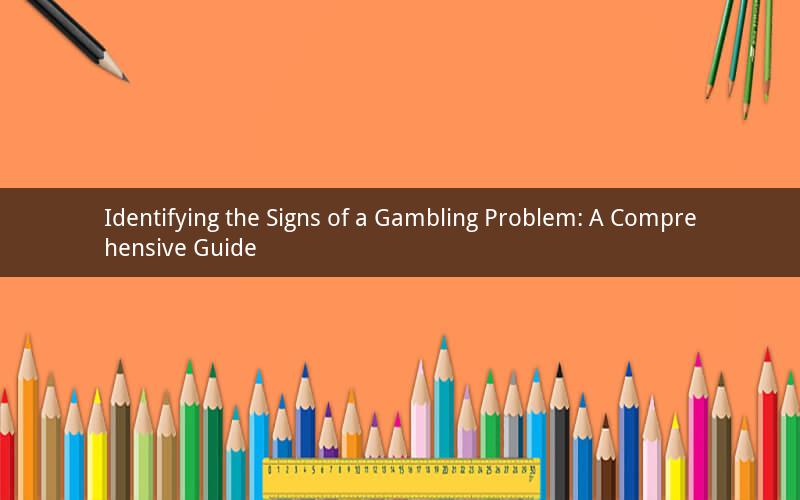
Introduction:
Gambling has become a popular form of entertainment for many individuals. However, it is crucial to recognize when gambling becomes a problem. In this article, we will explore various signs and symptoms that indicate a potential gambling problem, along with strategies to address it.
1. Increased Time Spent on Gambling:
One of the most evident signs of a gambling problem is spending an excessive amount of time on gambling activities. If you find yourself constantly thinking about gambling, neglecting responsibilities, and prioritizing it over other aspects of your life, it may be a red flag.
2. Financial Struggles:
Gambling problems often lead to financial difficulties. If you are experiencing a decline in your financial stability, such as accumulating debt, missing payments, or relying on loans to fund your gambling habits, it is essential to seek help.
3. Emotional and Psychological Symptoms:
Gambling addiction can have a profound impact on one's emotional and psychological well-being. Signs to look out for include feelings of guilt, anxiety, depression, and mood swings. These symptoms may also manifest as relationship problems, decreased productivity, and a lack of motivation.
4. Denial and Rationalization:
Denial is a common defense mechanism in gambling addiction. Individuals with a gambling problem may downplay their gambling habits, rationalize their behavior, or even blame others for their financial struggles. If you find yourself justifying your gambling behavior or avoiding acknowledging its negative consequences, it is important to seek professional help.
5. Withdrawal Symptoms:
Similar to other addictions, withdrawal symptoms can occur when a person with a gambling problem tries to cut back or stop gambling. These symptoms may include irritability, restlessness, anxiety, and even physical symptoms like insomnia or headaches.
6. Impact on Relationships:
Gambling addiction can strain relationships with family, friends, and loved ones. If you are experiencing conflicts, secrecy, or a breakdown in communication due to your gambling habits, it is a significant indicator of a gambling problem.
7. Legal and Social Consequences:
Gambling addiction can lead to legal issues, such as fraud or theft, as individuals may resort to illegal means to fund their gambling activities. Socially, it can result in isolation, loss of friendships, and a damaged reputation.
Addressing a Gambling Problem:
If you suspect that you or someone you know has a gambling problem, it is crucial to take action. Here are some steps to consider:
1. Acknowledge the Problem:
The first step is to admit that there is a problem. Denial can hinder progress, so be honest with yourself and seek support from trusted individuals.
2. Seek Professional Help:
Consulting a mental health professional who specializes in gambling addiction can provide valuable guidance and support. Therapy, counseling, and support groups can be effective in addressing the underlying issues and developing coping strategies.
3. Create a Support System:
Surround yourself with individuals who understand and support your journey towards recovery. This may include family members, friends, or support groups specifically designed for gambling addiction.
4. Develop a Budget and Stick to It:
Setting a strict budget and sticking to it can help prevent financial strain. Consider using tools or apps to track your spending and limit access to gambling websites or casinos.
5. Find Alternative Activities:
Engage in healthy and productive activities that can replace the time and energy previously spent on gambling. This could include hobbies, exercise, or joining social clubs.
Frequently Asked Questions:
1. Can a gambling problem be cured?
Yes, a gambling problem can be treated and managed effectively. With the right support and interventions, individuals can overcome their addiction and lead a healthier, more balanced life.
2. How long does it take to recover from a gambling problem?
The duration of recovery varies for each individual. Some may experience immediate improvements, while others may require ongoing support and therapy for several years.
3. Can medication help with gambling addiction?
Medication may be prescribed in certain cases to address underlying mental health issues or to reduce cravings. However, it is important to consult a healthcare professional for personalized treatment options.
4. Is it possible to gamble responsibly?
While it is possible to gamble responsibly, it is crucial to be aware of personal limits and set boundaries. Individuals with a history of gambling addiction may find it challenging to gamble responsibly without professional support.
5. Can a gambling problem affect my career?
Yes, a gambling problem can have a significant impact on one's career. It can lead to decreased productivity, financial difficulties, and legal issues, which may result in job loss or damage to professional reputation. Seeking help and taking steps towards recovery can help mitigate these risks.